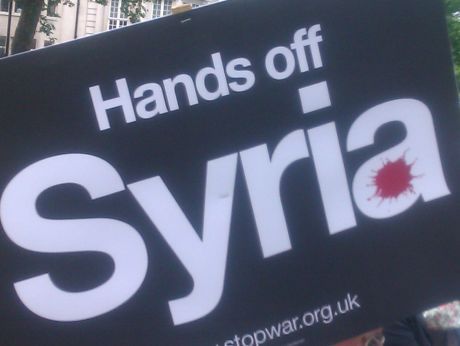Features
You are here
Stop Western intervention in Syria

February 7, 2014
The revolutionary wave that had existed in Syria is now stuck between the brutal Syrian government and the equally brutal sectarian forces that are now dominating the scene.
The uprising against Bashar Al-Assad is in a very dangerous position. The situation in Syria since the initial revolutionary wave has always been complex but the arrival of increasing numbers of Al-Qaeda linked groups has caused a real problem for those who seek peace and democracy. Over the past number of months, those groups such as the Al-Nusra front and the ISIS have been taking the initiative and this has set back any attempt at a revolutionary movement moving forward.
Sectarian groups
Over the past months the more brutal and sectarian forces have been gaining the upper hand in relation to the forces of the Free Syrian Army (FSA). The FSA as the armed wing of the Syrian National Council is already seen by many in Syria as being too tight with the western powers who have supported them. The British, US and the French governments have been sending armaments to the FSA to gain their own advantage against the Assad government.
The FSA however, has been subject to attacks from the sectarian forces. In December of 2013, the town of Aziz was overrun by the ISIS and they managed to take many of the weapons caches that the FAS had stored prompting the NATO powers to suspend shipments of weapons. On January 11, 2014 the Taftanaz airbase was also taken by the ISIS bringing them even more weaponry.
There are also reports of defections from the FSA and other rebel groups to the sectarian forces. In December of 2013, three of the leading non-Al-Qaeda rebels Ahmed Issa al-Sheikh and Zahran Alloush and Saddam al-Jamal all defected to join the sectarian groups. Only a month earlier, another seven brigades of the FSA left and joined with the Al-Nusra front.
It is always difficult to assess the relative numbers of the fighters on either side of a conflict and even harder to determine the numbers of defections. We have seen defections going either way. For example we have subsequently seen a split between ISIS and the Al-Qaeda forces and leading Al-Qaeda cleric Sheikh Abdallah Muhammad al Muhaysini calling for people leave the ISIS and join Al-Nusra. We have also seen various forces of the FSA fighting with the sectarian groups.
Regional rivalry
The spillover into Iraq and Lebanon has embroiled other regional powers even more firmly in the conflict. The Saudi government and many of the Gulf states are using the uprising to advance their own regional positions. They hope to undermine the Shia'a dominated governments in Iran, Iraq, Syria and the Lebanese group Hezbollah. For the Saudis, all these groups and states are an impediment to their desire to exercise more control over the area of the Middle East.
But it's not just the regional powers at play. The Saudi dictatorship has the full backing of the US, which is sending roughly $50 billion in weaponry each year. For the western powers, getting rid of Bashar Al-Assad would be a great advantage. They want to use the conflict to further isolate Iran, to undermine Russian influence in the region and to help the Israelis deal with Hezbollah. In this case, the interests of the Saudis and the west are in lock step.
Activists in the West
The changes on the ground in Syria pose difficult questions for revolutionaries in the west. While many of us have been strongly in support of the revolution against Assad, the increasing dominance of the sectarian groups makes calls for a broad support for the uprising problematic.
There are some who suggest that we need to call for support for Assad to stop some of these groups. That is a non-starter. Assad is a brutal dictator who has tortured and murdered tens of thousands of people. None of us supported Assad while he was torturing Canadian Maher Arar and a knee jerk, “we support Assad because he is against the designs of the imperial powers” response cannot stand up to any scrutiny if we are in support of the rights of the Syrian people.
What we need to do is maintain the principled opposition to the NATO powers using the conflict to gain geo-political advantage, and to oppose any potential military response from the West. We must also call for all foreign intervention to stop. It is the basic anti-imperialist position but one that is essential in this increasingly complicated situation.
We know that, whether in Egypt or Libya or Tunisia or anywhere that the Arab Spring uprisings have occurred, that western imperialism is doing all it can to manipulate the events to benefit their interests. In Canada our government has been vocal in its support for the opposition for the same cynical reasons. Canada is also one of the biggest boosters of Israeli policy and has called multiple times for an attack on Iran. Our job is to make sure that the Syrian people decide their future and that Stephen Harper and the government of Canada stay out of the conflict.
Section:










